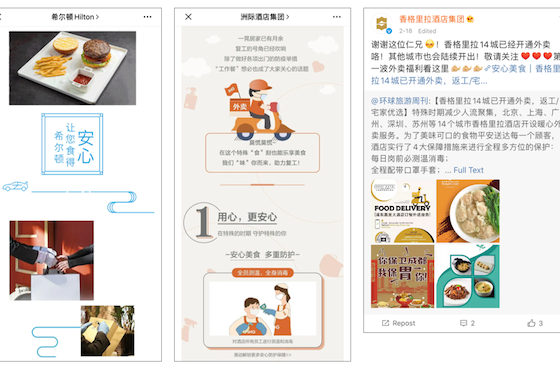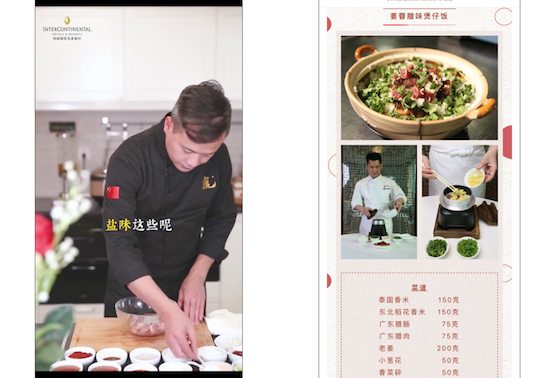International hotel brands’ digital marketing in China since the end of January provides valuable lessons in effective crisis communications and how to cultivate brand loyalty and develop new revenue sources during an epidemic. With COVID-19 now spreading globally, understanding these successful strategies from China can help the hospitality industry around the world.
Our analysis is based on Dragon Trail’s weekly rankings for international tourism brands on leading Chinese social media channels WeChat and Weibo.
Sienna Parulis-Cook is associate director of communications at Dragon Trail Interactive in London.
Start with cancellation policies
Initial crisis-related content on WeChat and Weibo from hotels focused on cancellation policies. Hilton, Shangri-La Hotels and Resorts, and Hyatt Hotels Corp., among others, all offered free cancellations or changes for reservations within China and overseas bookings made by guests who would be traveling from China. Reader comments were extremely grateful and positive. Updates to cancellation policies have been ongoing ever since.
Support medical workers
Hotel brands quickly joined in the fight against the novel coronavirus in China, and communicated this on social media. Hilton, Wyndham Hotels, Marriott International and Shangri-la all posted about charitable actions, including hosting front-line medical staff at their Hubei properties and delivering food to hospital staff across the country.
Demonstrate good hygiene
Consumers are now extremely concerned about hygiene, and international hotel chains reassured visitors with extensive information on their procedures.
Shangri-la published a detailed WeChat post showing rigorous cleaning procedures at reception, lobby areas, staff transportation vehicles, guest rooms, elevators, laundry and air vents. A WeChat post by Hyatt stressed the hygiene of their restaurants and food preparation, with photos to illustrate hygiene certification, training, cleaning and monitoring procedures around the country.
Salvage revenue through food delivery and laundry
Facing major declines in room stays and patronage of F&B venues, hotels are turning to new areas to help prevent a total collapse in revenue. The first is one of the few areas of the Chinese economy that’s actually thrived throughout the coronavirus crisis: food delivery.

Shangri-la, IHG and Hilton Hotels all have used social media to promote food delivery across the country. Posts include information on hygiene throughout the preparation and delivery process, how to order, participating hotels and restaurants, and promoted dishes.
What’s interesting about these WeChat posts is their high view rate. With 24,100 views, Shangri-la’s article got 31.3% more views than its top WeChat article published in the entirety of 2019. IHG’s food delivery post reading rate was 13.3% higher than anything the hotel group published last year. Hilton’s post got nearly three times its 2019 average views per WeChat article. While food delivery has increased in China, and online screen time is up, too, it’s also likely that hotels are advertising on WeChat to reach a larger audience.
Food delivery isn’t the only way hotels can make money. Shangri-la is promoting its professional laundry services, using short video, text and photos to stress the high hygiene standards and disinfecting capabilities of its facilities. There are promotions for household linens and bedding as well as clothes, and door-to-door pick-up and delivery are offered within 3 km of the hotel for an additional fee.
Nurture relationships and reach new audiences with online content
Views of online fitness videos and downloads of fitness apps have surged during China’s long self-isolation period, and hotels have picked up on this. In February, Meliá Hotels International used WeChat to publish short videos of simple yoga routines, created by its Bali staff, with a QR code to follow the Bali property’s official account. It got 13,900 views, well above Melia’s 2019 average. IHG shared short videos of fitness exercises on WeChat at the end of February. Hilton has been regularly posting videos on Weibo, featuring hotel gym staff demonstrating exercises that are easy to do at home.
[Photo Caption] Online fitness classes have surged in popularity since Chinese started isolating at home. Pictured (left to right): Short videos from Melia Hotels Bali, Intercontinental Hotels, and Hilton Hotels
Many housebound Chinese have gotten into home cooking during this period. Instructional videos and illustrated recipes allow hotels to connect with new audiences and show off their chefs’ skills.
IHG has been posting short videos of recipes on Weibo since mid-February, encouraging user interaction with competitions to win hotel vouchers. It ranked in the top three hotel Weibo accounts three weeks in a row because of this. Meliá also attracted views and comments for a seafood paella recipe on WeChat by offering prizes to followers who shared photos or videos of making the dish.
Alternating days with its fitness videos, Hilton has shared instructional cooking videos throughout March, averaging around 1,500 views per video – though the March 8 dessert tutorial from the Conrad Tianjin racked up 6,400 views.

Marriott launched a series of online Cantonese cooking classes from its chefs in Guangzhou. The live shows are broadcast over e-commerce site Taobao, and viewers have the chance to win prizes and buy discounted hotel vouchers. The video is later shared on WeChat, together with recipes for other dishes. Shangri-la also broadcasts live cooking classes on Taobao, and the hotel group’s WeChat account shares weekly recipes with short instructional videos.
